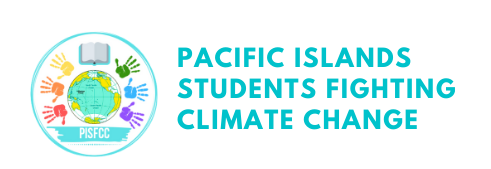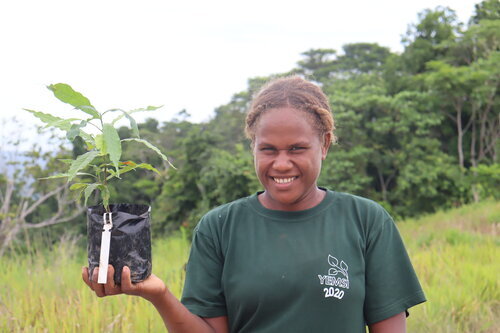Plant trees, plant hope: YEMSI 2020
On the 20th-21st November 2020, 50 local youth from numerous institutions of learning gathered at the Barana Nature and Heritage Park for a two-day environmental education event.
The 2020 theme of the event is ‘Tree blo yumi, Future blo yumi’ (Our trees, Our future).
The inaugural event was a communal initiative conceived by a group of ecologically-oriented stakeholders: Mai Ma’asina Green Belt (MMGB), The Pacific Island Students Fighting Climate Change (PISFCC), Solomon Islands National University (SINU); Isi Akson Theatre, Rangers Association, Barana Nature and Heritage Park, Solomon Islands Climate Action Network (SICAN), OneMoreShot (OMS), Sky Aelans, Live and Learn, Tookina Tribal Land Conservation Association (TTLCS), Solomon Islands Community Conservation Partnership, Critical Ecosystem Partnership Fund, Solomon Islands National Youth Council and Young Women Parliamentarian Leaders.
This pilot program is called the ‘Youth Environmental Movement Solomon Islands’ (YEMSI) and it is purposely designed to foster environmental education of the youth of Solomon Islands. It is to encourage them to be informed and become the better decision makers and custodians of the environments of Solomon Islands.
The organizers directed the flow and ownership of the event through the distinctive local branding of day one as, ‘Umi stori’ (let’s converse), and day two as ‘Umi akson’ (let’s take action), a holistically strategic two-fold approach to address the contemporary problem over the disconnection between youths and their environment.
Students from institutions of learning: SINU, Norman Palmer and White River High School, were randomly grouped under distinctive tree species with other participants from the Barana community, Isi Theatre group, youths from the San Isidro Care Centre for the deaf and mute and People with Disabilities Solomon Islands (PWDSI). ‘Umi stori’ ensued with elaborate discussions for each group on the importance of various trees in society, where most participants realized and revisited their own traditional knowledge in correlation to their uses in their final presentations.






Noel Salini, a student of Norman Palmer, from team Koilo presented, “Koilo (Calophyllum inophyllum) has many important uses to the people of Solomon Islands. To name a few, they are used to make ship railings, oil extracted from its fruit can be used as traditional medicine and its leaves have a traditional fish stupefying toxin that can be used to catch fish.”
This gradual recollection of traditional knowledge by participants exposed a gap in the connection between conservation, and understanding how culture has played a central role as a steward of biodiversity. A probable implication of a growing apathy in youth towards actively learning traditional knowledge due to the prominence of modernized lifestyles. An area that will be explored for effective engagement of youths.
Mary Tahu, a lecturer at Solomon Islands National University, commented:
Lecturer Mary Tahu holding baskets of hand-woven coconut frond
“The importance of understanding the traditional knowledge of our environment is to conserve existing biodiversity and revive our culture since our cultures are strongly connected to our biodiversity and the natural environment. Therefore, documentation of local names of plant and animal species, cultural and ecological importance of forests including their conservation status is critical to achieving this goal and build resilience to climate change in the coming years.”
In testament to the pivotal ties between conservation and culture, the community women of Barana provided lunch catering using hand-woven coconut frond plates that were reusable the next day. The use of plastic utensils was conveniently replaced.
Junior Patrick Makau (Filmmaker, One More Shot) from observation said that,
Junior Patrick Makau a young filmmaker from One More Shot
“Plastic pollution is a nasty issue in the Solomon Islands. The wanton disposal and inconsiderate consumption of single use plastic products contributes to the decline of our biodiversity. Civil society in the Solomon Islands must play an effective role to encourage the use of eco-friendly products in their day to day activities.
We all can learn from the women of Barana who at the event have crafted coconut baskets in lieu of Styrofoam and/or plastic disposable plates which is environmentally friendly alternative and easy to make. I hope all CSOs can encourage the use of eco-friendly products in all their events in the future. We can make Solomon Islands green again.”
‘Umi Akson’ gathered the jovial collective at one of the park's planting sites where participants actualized their prior learning through an intimate planting of a hundred tree saplings. Each participant wrote their names on a wood block and buried it together with the tree sapling named to create a symbolic bond that would filter into their overall conduct towards trees and the environment.
Due to the cross cutting nature and the gravity of the climate crisis, it is inevitable that during the event it was constantly raised by the participants, mainly drawing on the nexus between the crucial role of trees against the global fight against climate change. 100+ tree saplings were planted on the day.
British High Commissioner to the Solomon Islands, Dr Brian Jones, an eager participant, showed his commitment to the cause as well by planting his own tree and passionately said,
"It was inspirational to see this group of young people taking such an active, practical interest in preserving the environment and understanding the pressures on the fragile Pacific Island ecosystems. It is only through action now by young people that we stand a chance of leaving a sustainable, diverse environment for future generations. And it is only through the action of leaders, with the support and encouragement of young people, that we stand a chance of halting the damaging effects of climate change and protecting this beautiful region's biodiverse climate from the forested ridges to the teeming coral reefs."
Traditional welcome: Women of Barana community welcoming High Commissioner
Barana Nature and Heritage Park Chief Ranger Eric Hohosi and High Commissioner planting an endangered Rosewood sapling (Ptercarpus indicus).
In an honouring ceremony, for a lifetime devoted to saving and articulating injustices against the shared environment, the winner of Umi Stori group presentations, the Cutnut group, together with the British High Commissioner planted a Ngali Nut (Canarium Indicum) sapling - a deeply sentimental tree to the people of Melanesia for the natural historian Sir David Attenborough. The tree is a monument for Sir David’s life of inspiring work that has and is continuing to awaken the global consciousness to the recognition of the importance of the environment and biodiversity.
Sir David Attenborough have been committing his life documenting and conducting a comprehensive survey of animal and plant life on Earth. Photo credit: BBC
Final tree was planted in honor for Sir David Attenborough’s lifework that continues to provide the present and future generations a reason to become better stewards of our Planet.
Caleb Pollard, President of the Pacific Islands Students Fighting Climate Change, on environmental education:
Caleb Pollard is the President of the Pacific Islands Students Fighting Climate Change.
“This has been a step forward towards upholding and reviving the value of our forest, the lungs of our earth. We must continue to provide these opportunities for our youth to take responsibility and pride in our forests. This also calls for the Government to rethink how environmental education is being emphasized in our education system. After decades of destructive deforestation, this generation is choosing a future towards sustainable development.”
Another key achievement of YEMSI 2020 was its focus on promoting and encouraging inclusivity. The event ensured the participation of people with disabilities in all the activities in perhaps the most emphatic statement of the need for ‘all’ of us to work to protect our environment.
Cedella Nongebatu curiously learning sign language from a student from SanIsi Dro school for the deaf and blind.
Shabella Rathamana (Networking Officer, Solomon Islands Climate Action Network) on people with disabilities:
Shabella Rathamana is the Networking Officer for the Solomon Islands Climate Action Network
“The event too was also an opportunity for students from SINU, White River, Norman Palmer and youths of Barana to acknowledge participation of people with special needs in the event and engage in interactive learning and sharing of information with each other and I hope that this experience will change their perspective, to see them not for their disability but their ability and their equality that they possess and the importance of being inclusive of everybody when it comes to Climate Change Spaces.”
Hosting an occasion that focuses purposely on convening the poorly represented and ignored majority of the Solomon Islands population and acknowledging their need to connect with their environment by educating them effectively, is a key step towards a better, environmentally-savvy and accountable Solomon Islands.
YEMSI 2020 has highlighted the untapped agency of youths and the collective power their voices can bring to a table they have not been invited to.
The Mai-Ma’asina Green Belt (MMGB) and Pacific Island Students Fighting Climate Change (PISFCC) are aiming to make this an annual event.
Words of thanks
Our sincere gratitude to the British High Commission Office Solomon Islands, Mai Ma’asina Green Belt (MMGB), Solomon Islands Rangers Association, Solomon Islands National University (SINU); Isi Akson Theatre, Rangers Association, Barana Nature and Heritage Park, Solomon Islands Climate Action Network (SICAN), OneMoreShot (OMS), Sky Aelans, Live and Learn, Tookina Tribal Land Conservation Association (TTLCS), Solomon Islands Community Conservation Partnership, Critical Ecosystem Partnership Fund, Solomon Islands National Youth Council and Young Women Parliamentarian Leaders, People with Disability SI (PWDSI), SanIsi Dro School of Deaf and Blind, volunteers, Barana Community members, and those whose names and organizations who have not mentioned.






















